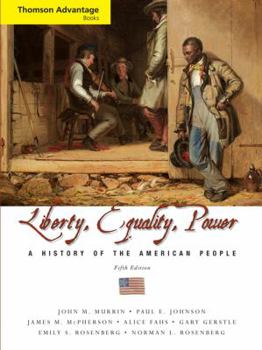Liberty, Equality, Power: A History of the American People
Select Format
Select Condition 
Book Overview
Understanding the past helps us navigate the present and future. When you read this text, you will not only learn about American History, you will be exposed to movies and music that tell the stories... This description may be from another edition of this product.
Format:Paperback
Language:English
ISBN:0495411019
ISBN13:9780495411017
Release Date:May 2007
Publisher:Wadsworth Publishing Company
Length:1258 Pages
Weight:4.30 lbs.
Dimensions:2.1" x 6.4" x 9.3"
Related Subjects
Americas History Political Science Politics & Government Politics & Social Sciences TextbooksCustomer Reviews
1 rating
A real gem to any history reference library
Published by Thriftbooks.com User , 15 years ago
How can a book that is co-authored by James McPherson be bad? This book is a gem! Filled with archived paintings, political cartoons, maps and even sections on "History Through Film, Music Art", readers quickly realize that they aren't reading just boring political history as seen by the dominant Anglo society, but a social and cultural history of the United States; while politicians are politicking, common people are creating literature, music and art. Everything comes together in these chapters. With this book come accessories via the internet. Primary sources can be easily opened from other domains to help the reader with critical thinking. This is a great college-level history book. Events are brought together to make a history student realize how events of the last century still apply today. Focusing on events that show their significance and subsequent results to other events is what learning about history is about, it's not just memorizing tables and facts and dates. The following is an excerpt on a section called Ethnicity, Religion and the Schools: The argument between Whig centralism and Democratic localism dominated the debate over public education until the children of Irish and German Catholic immigrants entered schools by the thousands in the mid 1840s. Most immigrant families were poor and relied on their children's earned income. Consequently, the children's attendance at school was irregular at best. Most immigrants were Catholics. The Irish regarded Protestant prayers and the King James Bible as heresies. Some of the textbooks were worse. Olney's Practical System of Modern Geography , a standard textbook, declared that "The Irish in general are quick of apprehension, active, brave and hospitable, but passionate, ignorant, vain and superstitious." Many Catholic parents refused to send their children to school. Others demanded changes in textbooks, the elimination of the King James Bible, tax-supported Catholic schools, or at least tax relief for parents who sent their children to parish schools. Whigs, joined by many native-born Democrats, saw Catholic complaints as popish assaults on the Protestantism that they insisted was at the heart of American republicanism. Many school districts, particularly in the rural areas to which many Scandinavian and German immigrants found their way, created foreign-language schools and provided bilingual instruction. In other places, state support for church-run schools persisted. But in northeastern cities, where immigrant Catholics often formed militant local majorities, demands for state support led to violence and to organized nativist (anti-immigrant) politics. In 1844 the Native American Party, with the endorsement of the Whigs, won the New York City elections. That same year in Philadelphia, riots that pitted avowedly Whig Protestants against Catholic immigrants, ostensibly over the issue of Bible reading in schools, killed 13 people. (291/292) The book's only do





